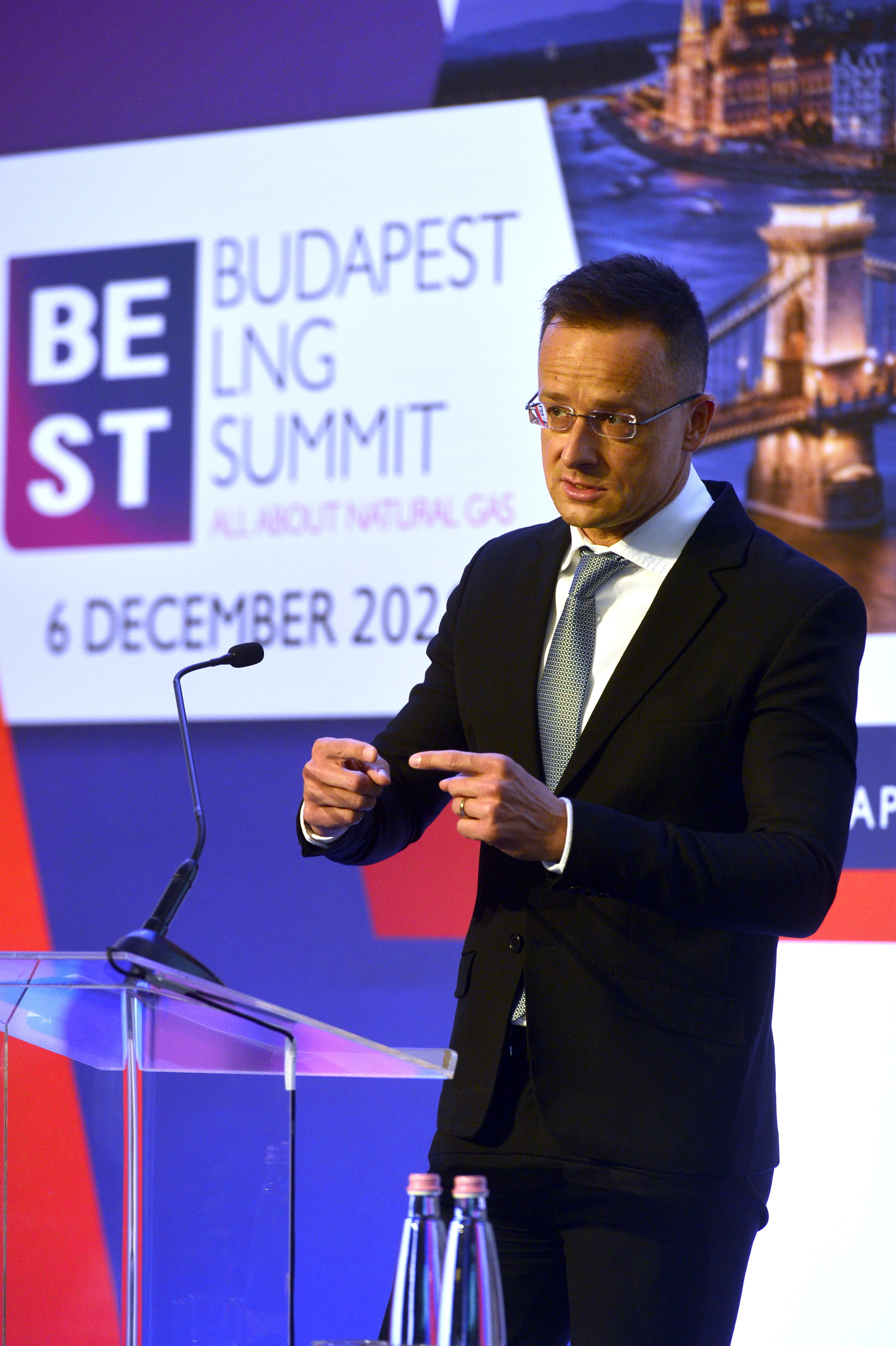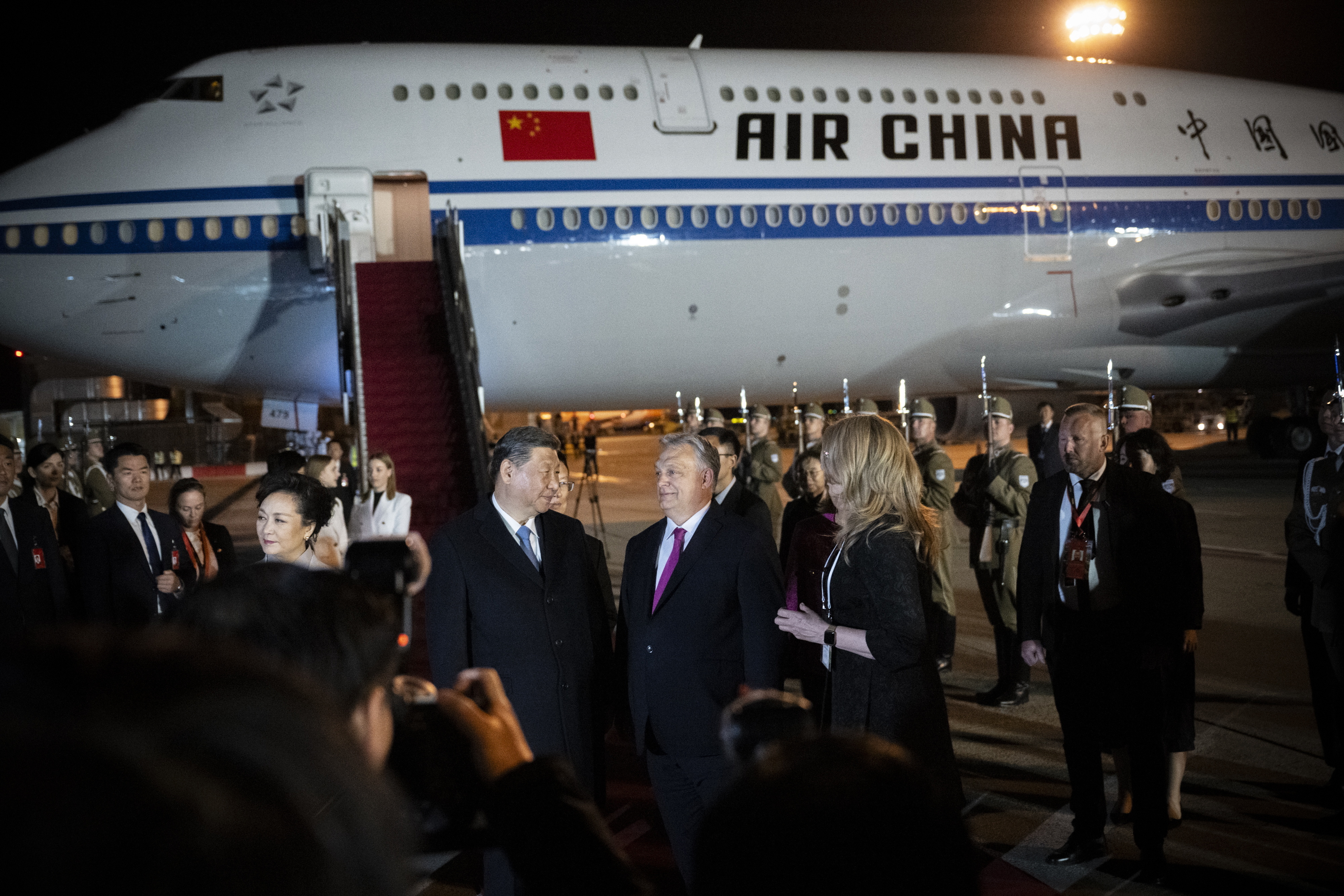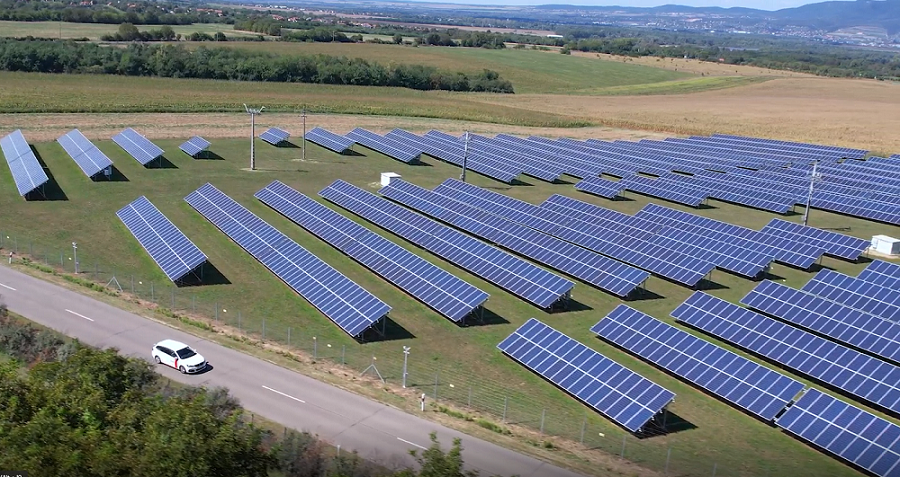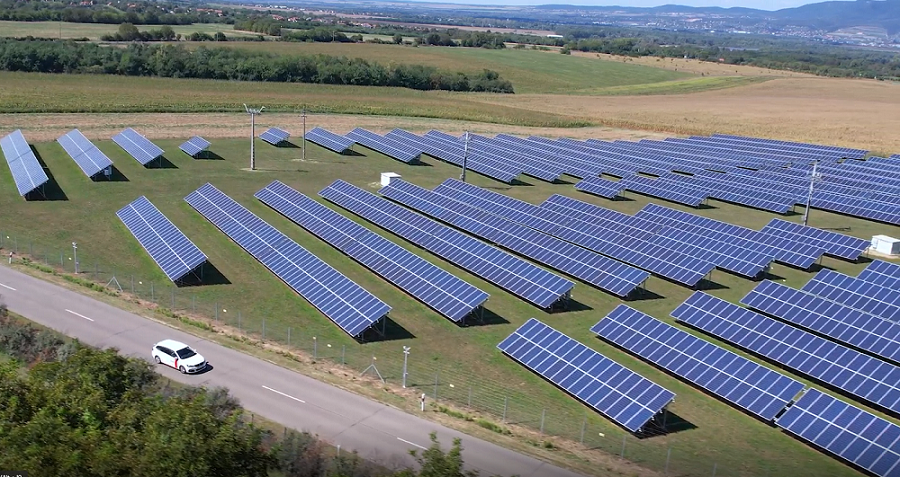Szijjártó Lambasts European Assumptions on Energy Security

Minister of Foreign Affairs and Trade Péter Szijjártó gives the opening speech at the Budapest LNG Summit on Dec. 6, 2021.
Photo by Attila Kovács / MTI
Minister of Foreign Affairs and Trade Péter Szijjártó, speaking at the third LNG (Liquified Natural Gas) Summit in Budapest on Dec. 6, pilloried European authorities and energy companies for what he termed their “irresponsible approach” to Central European energy needs while arguing that Hungary has enacted a “comprehensive and responsible” energy policy over the past decade.
European governments everywhere have understandably focused on combating the coronavirus pandemic for the past two years, but this has led to lax energy security and, ultimately, to the “crisis” currently facing the continent, Szijjártó told delegates in his opening address to the summit.
“Maybe all of us have considered the safe and secure energy supply of the continent as a fact. But that was a mistake. It’s not a fact; it’s something for which we have to continuously work,” he emphasized.
“This kind of irresponsible approach [...] has consequences, and a price has to be paid. Unfortunately, mostly by the customers of the continent,” he added.
In contrast, Hungary, where the government and energy authorities have been following prudent energy policies for more than a decade, has been “continuously [sounding] the alarm” that the energy supply situation of the continent is “in the 24th hour,” the minister insisted.
“I regret to say [it], but we Europeans had all possibilities to prepare for and prevent such a situation. […] We should have put predictability and a professional way of decision-making in focus, instead of dogmatically and politically motivated decision-making,” he argued, although he failed to cite a concrete example of these alleged mistakes.
For Szijjártó, the main concern was that the difficulties and costs of the transition to a carbon-neutral economy had “seemingly” been forgotten, and he pointed to four “major mistakes” that had been committed, all of which had contributed to the current crisis.
No Significant Investments
First, he lamented that no significant investments or projects had been launched, let alone completed, in “the region of Europe which is the most exposed and most defenseless towards one dedicated source of energy.”
Regarding the diversification of routes and sources, he said some “forward progress” had been made in the region, presumably alluding to recent interconnector projects with Hungary’s neighbors. Yet, in his assessment, no “real game-changer project or investment” had been undertaken in the region.
Second, the minister alleged that politics and ideologies “have been too much confused with energy issues” in recent years. “It is impossible to heat houses and flats, and it is impossible to operate industry with political statements,” he said. Hungary and its neighbors need gas, and to get that, “either you have to exploit it or you have to buy it.”
Moreover, Europe had indulged in “a short-sighted way of thinking;” strategic decisions to fully utilize storage capacities had either not been made or not been implemented. This third mistake had left Western Europe with “much lower” reserves than in earlier years and, by implication, less capable of handling the recent price surges.
As for the fourth blunder, “while we were speaking about our green deal, how to reach the 2030 and 2050 [climate change targets], the forms of energy in the transition period have been negatively discriminated [against].” In particular, this had resulted in “unnecessary anti-gas and anti-nuclear” sentiment, which had hampered clear thinking on energy matters, he argued.
As a result of such dithering and poor decision-making, Hungary had been left with few choices when determining its energy policies in general and gas policy in particular. The minister maintained that this resulted in condemnation from Western circles, which was more than a little hypocritical.
‘Bunch of Contradictions’
“We have received a lot of criticism in recent years because of our energy cooperation with Russia. To us, it’s a little bit, well, not a little bit, a big bunch of contradictions, because those who have criticized us have not done anything to change this situation in the region; namely, being exposed to one source of gas and one source of energy,” Szijjártó said.
He declared Hungary “had not received any help in this regard,” which sounded somewhat disingenuous considering all the interconnector projects had benefited from significant European Union funding.
Nonetheless, Szijjártó insisted that “everyone knew” Hungary’s former long-term gas contract with Russia would finally expire at the end of last September and that this “could create a totally new situation in this region.” Yet, no additional gas sources were added to the country’s energy mix.
“I’ve had dozens of negotiations with those Western companies who own the rights to exploit the offshore gas field in the Romanian Black Sea. And they promised me that the final investment decision is to come and that we could count on this new resource when it comes to our upcoming energy mix,” he said. Hungarian companies had “even signed contracts with these Western companies to buy gas from them.”
Yet, to date, not only had no final investment decisions been made, but he complained: “Now we have heard news that these contracts will be canceled by these Western companies!”
Given this situation, Hungary had no choice but to once again sign up on a long-term contract with Russia.
“Of course, I can only speak based on my own experience, but I have to tell you that negotiating with [the leaders of Gazprom] has not been the easiest chapter of my practice. But once we agree, those agreements have always been kept. Our cooperation with Gazprom, and once again, this is an experience, not a political statement, has always been reliable and fair, and I see no reason not to continue that,” Szijjártó concluded.
Hungary Plays its Part in Developing Energy Infrastructure: Szijjártó
Hungary has “always supported projects and plans that contribute to the energy security of Europe, and will continue to do so,” foreign minister Péter Szijjártó insisted in his address.
He pointed to the construction of the LNG terminal on Krk island, in the Croatian Adriatic, as a project which Budapest had supported from the very start, with an interconnector linking Hungary to Croatia, allowing for gas flows in either direction, according to demand.
While not a game-changer, “when it comes to the historic situation, it is something really new because this gave us the chance to sign a long-term gas contract with a non-Russian company for the first time ever in our history. We have signed a [contract] with Shell to buy 250 mcm of gas on an annual basis for a period of seven years. This has made LNG gas part of our national energy mix, and to a certain extent, it definitely contributes to us being able to uphold one of the lowest utility costs in Europe,” Szijjártó declared.
In addition, Hungary has made “significant efforts” to link the country to the southern gas corridor.
“We have done all our homework by constructing the interconnectors to Romania, Croatia, Slovakia and Serbia,” he declared. Except for Slovenia, Hungary is now physically linked to six out of its seven neighboring states’ high-pressure gas transmission systems.
This article was first published in the Budapest Business Journal print issue of December 17, 2021.
SUPPORT THE BUDAPEST BUSINESS JOURNAL
Producing journalism that is worthy of the name is a costly business. For 27 years, the publishers, editors and reporters of the Budapest Business Journal have striven to bring you business news that works, information that you can trust, that is factual, accurate and presented without fear or favor.
Newspaper organizations across the globe have struggled to find a business model that allows them to continue to excel, without compromising their ability to perform. Most recently, some have experimented with the idea of involving their most important stakeholders, their readers.
We would like to offer that same opportunity to our readers. We would like to invite you to help us deliver the quality business journalism you require. Hit our Support the BBJ button and you can choose the how much and how often you send us your contributions.











